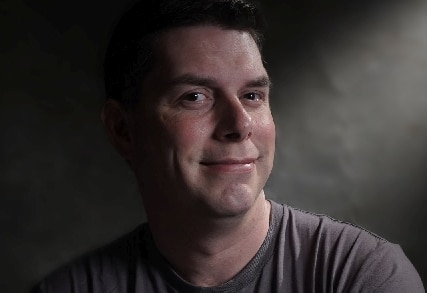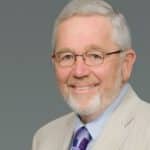Editor’s note: In his new book, Open Heart, Warrior Spirit: A Man’s Guide to Living With Cancer, patient activist Trevor Maxwell explains why men go into their “man caves” when facing a cancer diagnosis; provides tips for avoiding that dangerous isolation; and tells the story of his quest to stay alive and create a “wolfpack” for guys with cancer. Maxwell, founder of Man Up to Cancer, has been living with stage IV colon cancer since his diagnosis in March of 2018. He has had five major abdominal surgeries, more than 50 rounds of chemotherapy and immunotherapy, and has participated in a clinical trial at The Johns Hopkins Hospital. In this excerpt, Maxwell writes about the importance of the patient-to-patient movement in the cancer community, and how patients can extend their lives by learning from one another.
About a year into my cancer journey, I was interested in learning about clinical trials. I consulted with a few doctors at a major cancer center in the Northeast. They talked about the trials available at their center. They were smart and kind, and they let me know they did not have any clinical trials currently that matched my criteria, but there could be some coming in the future.
I thought this meant there were no clinical trials for me ANYWHERE. What I didn’t realize is that they were only telling me about the options at their institution.
It was not part of their practice to go the extra mile, to explore with me the trials that I might be eligible for at other cancer centers, like Johns Hopkins, MD Anderson, Duke University, or City of Hope.
And I’m not blaming them at all. They weren’t being malicious. At large cancer centers, many doctors don’t even have the bandwidth to know the trials available at their own hospital, let alone the thousands of trials available elsewhere.
It’s also a matter of business. Cancer centers are designed to keep you as a patient, so you don’t need to go elsewhere. These centers can feel like silos, cut off from one another in many ways.
I’m not saying doctors withhold information that could help their patients; they simply don’t have the time and resources required to search clinical trials all day long, for each individual patient.
When I told my friends in Colontown that I had struck out looking for trials at the one major cancer center, they bombarded me with high quality information about trials at other centers that matched my disease criteria.
As I said earlier, I had thought I would learn the most about my disease and my treatment options from my medical providers. As it turned out, I have learned the most from other patients who have walked the same road.
Most types of cancer have national or international organizations that advocate for awareness, public policy changes, and treatment advances. Those organizations usually have online communities, which is where the patient-to-patient movement lives. Your job is to find the best, most trusted, most reliable communities, and then to dive in.
Julie Saliba Clauer, whom I mentioned in Chapter 6, was diagnosed with stage IV colorectal cancer in March of 2018, the same month and year in which I was diagnosed. She was 43 years old then, and her daughter was only seven months old. Julie has since navigated her journey with the help of Colontown, and she now serves on its leadership team, focusing on patient education.
Julie interviewed seven oncologists in her quest for the right person who could extend her life and give her more time with her husband and daughter. She moved from Chicago to California, to be under the care of one of the world’s top medical oncologists at the University of Southern California, Dr. Heinz-Josef Lenz.
By combining traditional techniques with a cutting-edge clinical trial, Julie has far outlived her initial prognosis.
Before cancer, Julie spent her life immersed in the languages of food, travel, and marketing. When she was diagnosed with colorectal cancer that had spread to her liver, she googled, “Where is my liver?” I was in that same boat when I was diagnosed. I remember googling, “Where is my colon, and what does it do?”
“I was medically and scientifically clueless,” Julie recalled. “I lined up an incredible care team. But it was Colontown where I learned the language and how to navigate all things cancer. From my fellow patients, I became familiar with clinical trials from watching them and asking questions when I was confused. I got a humanized crash course in scientific research, treatment strategy, personal decision making, and statistics. All of this enabled me to have meaningful conversations about clinical trials with my oncologist, reach out effectively to primary investigators on other trials of interest, and make well informed treatment decisions.”
Armed with her new language, Julie now gives back so much to Colontown and the larger colorectal cancer community. She spends much of her time educating other patients about treatment options and clinical trials.
Just because you are not an oncologist doesn’t mean you can’t learn about cancer and take an active role in your treatment.
If you hire an architect, you can learn plenty about architecture and design, to the point that you can collaborate with the architect. It’s your house, right?
If you hire a lawyer for a business dispute, you can learn plenty about the law, to the point that you can collaborate with your lawyer. It’s your business, right?
The same principle applies to oncology. Yet we are made to think that we should just take a back seat, do what the doctor tells us, and don’t rock the boat. That is an old-school, patriarchal model of cancer care. There are still plenty of people who would tell us that we are just patients.
They say we aren’t smart enough to understand medicine.
Do not be intimidated. No matter what your education or background, you can absolutely learn enough about your disease to play an active role in your care. If you struggle with the learning, find family members, friends, or advocates who will stand up with you. If your oncologist doesn’t want your input, fire them.
It’s your life on the line, and you have the absolute right to be involved in the decisions around your care. Period.
From Open Heart, Warrior Spirit: A Man’s Guide to Living With Cancer, by Trevor Maxwell, published by Man Up to Cancer, copyright © 2022. Reprinted by permission of the author.
Do you appreciate articles like this and want to see more? Please consider supporting the Society by joining here: https://participatorymedicine.org/memberships/







Such an excellent article, many thanks for sharing this.